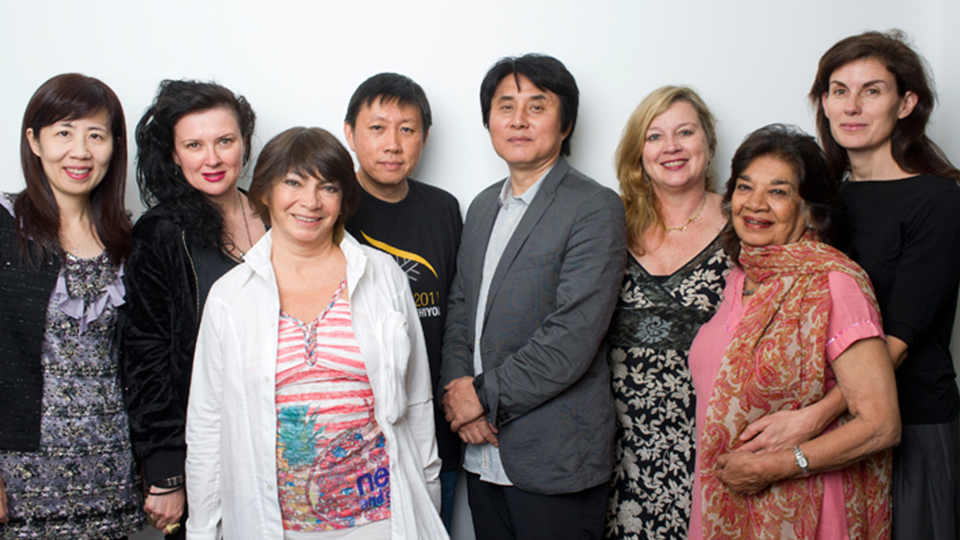 APSA 2012 International Nominations Council: Wang Qun (People’s Republic of China), Maxine Williamson (Australia), Jocelyne Saab (Lebanon), Philip Cheah (Singapore), Hong-Joon Kim (Republic of Korea), Anne Démy-Geroe (Australia), Aruna Vasudev (India) and Kathryn Weir (Australia).
APSA 2012 International Nominations Council: Wang Qun (People’s Republic of China), Maxine Williamson (Australia), Jocelyne Saab (Lebanon), Philip Cheah (Singapore), Hong-Joon Kim (Republic of Korea), Anne Démy-Geroe (Australia), Aruna Vasudev (India) and Kathryn Weir (Australia).
Jocelyne Saab – A Woman of Grit, a Filmmaker of Substance
Jocelyne Saab, widely considered one of the most important contemporary Arab filmmakers, passed away after a brave and difficult battle with cancer on 7 January. Although death had long been hovering, many of us in contact only through texting or phoning were taken by surprise, as the usual season’s greetings had been exchanged with no hint that this beloved member of our film community would leave us within a week.
Journalist, war reporter, award-winning filmmaker, photographer, artist and cultural worker, Jocelyne directed some 30 documentaries and three feature films. Much of Jocelyne’s work revolved around the destruction of the city of her birth, Beirut. With her first feature documentary, Lebanon in Turmoil, (1975, awarded the Arab Critics Prize), she began documenting the politics of the Lebanese Civil War (1975–1990) by interviewing prominent politicians and religious leaders, a model she was to follow with the little seen but important Utopia in the Making, 1980, made in the newly founded Islamic Republic of Iran. Between 1976 and 1982 she made the so-called Beirut trilogy, which portrays “the sorrow of loss” of place. Her first feature film, Suspended Life (1985), selected for Cannes, was also shot in Beirut during the civil war. Thematically, memory and resistance to oppression underlie all these works.
But Jocelyne also shot films in and about Egypt, Iran, Kurdistan, the Sahara and Vietnam. Probably the best known of her three fictional features, Dunia/ Kiss Me Not on the Eyes (2005), an elegant and poetic but highly controversial film dealing with female circumcision, was set and shot in Egypt. Dunia, had brought both nominations and wins in festivals from Sundance to Kerala and death threats from fundamentalist Egyptians. (Jocelyne was no stranger to harassment in relation to her filmmaking – the French intelligence had interrogated her endlessly while she was making the films about the Lebanon War and there were death threats in Lebanon.) Another of her better known films is Lady of Saigon, a sensitive portrait of a paediatrician from a wealthy background who chose the Vietcong side after the fall of Saigon.
In later years Jocelyne turned to photography and indeed published her first book of photographs, Zones de Guerre or War Zones, spanning many years of work, just three weeks before her death.
Jocelyne did more than create images – her contributions to political justice were made in various forums. She was a senior and active member of NETPAC, which she joined in 2002, and of the APSA International Nominations Council. In 2013 she established the Cultural Resistance International Film Festival in Lebanon, which ran for three editions, till she was unable to continue.
Jocelyne was widely loved and admired – for her indefatigable passion and her unabating and resolute stand against oppression of any kind; for her own loving kindness; for her light and her verve.
APSA pays tribute to a passionate, resolute and intrepid filmmaker.
Written by Anne Démy-Geroe, APSA International Nominations Council member
